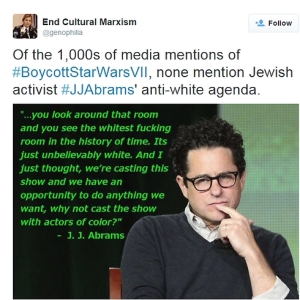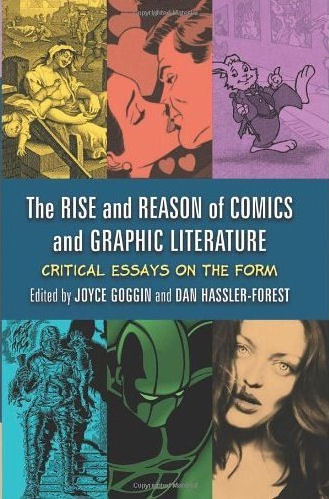 Last year, shortly after the first full trailer for The Force Awakens was released, news started circulating that a bunch of crazy white people had somehow taken offense about the decade’s most anticipated blockbuster. The trailer’s revelation that the two new Star Wars heroes were a black man and a young woman caused a bunch of MRA nuts and white supremacists to describe TFA as a form of “white genocide,” quickly thereafter launching a #boycottstarwarsVII hashtag campaign on Twitter. While they later bragged about having cost the movie over $4 million in ticket sales, the whole thing seemed quite obviously pathetic and even patently ridiculous to me at the time: from the comfort of my own filter bubble, these white supremacists were little more than a laughable and ultimately harmless fringe group, railing pointlessly against a popular culture that was slowly but surely becoming more diverse, more inclusive, and more progressive.
Last year, shortly after the first full trailer for The Force Awakens was released, news started circulating that a bunch of crazy white people had somehow taken offense about the decade’s most anticipated blockbuster. The trailer’s revelation that the two new Star Wars heroes were a black man and a young woman caused a bunch of MRA nuts and white supremacists to describe TFA as a form of “white genocide,” quickly thereafter launching a #boycottstarwarsVII hashtag campaign on Twitter. While they later bragged about having cost the movie over $4 million in ticket sales, the whole thing seemed quite obviously pathetic and even patently ridiculous to me at the time: from the comfort of my own filter bubble, these white supremacists were little more than a laughable and ultimately harmless fringe group, railing pointlessly against a popular culture that was slowly but surely becoming more diverse, more inclusive, and more progressive.
Writing an article for online sf journal Deletion in the month before the election, I was still roundly dismissive of these angry white men within fan culture, confidently stating that racism, misogyny, and other forms of toxic masculinity only really exist in the margins of a lively and dynamic global fan culture. Guided in part by a social media algorithm designed to give me a daily worldview that was inherently familiar and reassuring, I basked in the comfortable illusion that in this war at least, our side was all too obviously winning – and I didn’t mind gloating a bit about the enemy’s well-deserved and long-overdue comeuppance.
But when re-reading my words less than a month after I’d written them, a few weeks after the US election, they suddenly seemed profoundly naïve. My own circle of personal and professional peers, whom I interact with mostly via Facebook and Twitter, generally approach fandom as a transformative and progressive subculture, now finally liberated (more or less) from the many negative assumptions and stereotypes that used to bother us nerds. It seemed clear to us all that “geek culture” had finally triumphed, and bullies of all sorts were in the process of being relegated to the sidelines. Deplorable movements like GamerGate, the Sad Puppies, and Star Wars nazis were the pathetic final hold-outs of an all but defunct culture under white patriarchal hegemony.
 Of course we can now see more clearly that the democratizing impact of digital culture and media convergence cuts both ways: for every clever geek who can make (ambiguous) fun of Donald Trump by inserting him into Game of Thrones, there’s also a neo-nazi who produces a pro-Trump Terminator mashup called The Trumpinator. And while online culture surely fosters communities of transformative, subversive, and progressive fans, platforms like 4chan are at the same tie radicalizing and mobilizing men of all ages who use the same digital platforms to harass and humiliate anyone they see as a threat to white patriarchal supremacy.
Of course we can now see more clearly that the democratizing impact of digital culture and media convergence cuts both ways: for every clever geek who can make (ambiguous) fun of Donald Trump by inserting him into Game of Thrones, there’s also a neo-nazi who produces a pro-Trump Terminator mashup called The Trumpinator. And while online culture surely fosters communities of transformative, subversive, and progressive fans, platforms like 4chan are at the same tie radicalizing and mobilizing men of all ages who use the same digital platforms to harass and humiliate anyone they see as a threat to white patriarchal supremacy.
So now that these radical “alt-right” fascist fans clearly feel legitimized and emboldened by Trump’s persona, by his tone, and by his election, it seems more dangerous than ever to continue to “misunderestimate” this dangerous strain of ideologically driven far-right fan culture. I was glad therefore that I had a chance to revise the wording of my original essay, changing it from a celebratory pat on the back of an implicitly progressive Star Wars fandom to a word of warning about a culture war that is clearly nowhere near over:
Today, we need to learn to recognize and understand these new forms of online fan culture that are mobilizing under the neo-fascist “alt-right” banner in the Trump era.







Pingback: Closing Every Tab Not In Anger But In Disappointment Links | Gerry Canavan
Pingback: “The Last Jedi”: Saving Star Wars from Itself - Next Step News